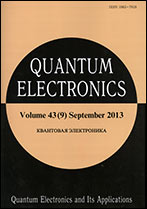|
Brief Communications
Induced aberration
Yu. I. Kruzhilin
Abstract:
A theoretical analysis is made of the influence of a light beam on the distribution of intensity in the focal region of an aberrationfree lens. This analysis is performed for two mechanisms of the interaction between the incident radiation and the lens material: the Kerr effect and thermal changes in the refraction. Expressions are obtained for the permissible power density in a rectangular pulse and the change in this power with the pulse shape is found. An estimate is obtained of the pulse power (and energy in the case of the thermal interaction) needed to displace the first axial minimum to the diffraction focus of the lens.
Received: 26.08.1974
Revised: 08.12.1974
Citation:
Yu. I. Kruzhilin, “Induced aberration”, Kvantovaya Elektronika, 2:5 (1975), 1084–1087 [Sov J Quantum Electron, 5:5 (1975), 593–594]
Linking options:
https://www.mathnet.ru/eng/qe11222 https://www.mathnet.ru/eng/qe/v2/i5/p1084
|


|





 Contact us:
Contact us: Terms of Use
Terms of Use
 Registration to the website
Registration to the website Logotypes
Logotypes








